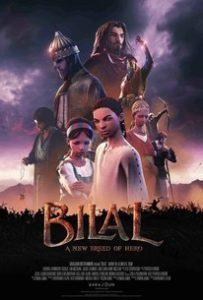Bilal: A New Breed of Hero
Posted on February 1, 2018 at 12:46 pm
B| Lowest Recommended Age: | High School |
| MPAA Rating: | Rated PG-13 for violence/warfare and some thematic elements |
| Profanity: | Mild language |
| Alcohol/ Drugs: | None |
| Violence/ Scariness: | Extended and sometimes graphic peril and violence, torture, whipping a child, sad loss of parent, war scenes, many characters injured and killed, some disturbing images |
| Diversity Issues: | A theme of the movie |
| Date Released to Theaters: | February 2, 2018 |

For as long as there have been humans, there have been efforts to divide into groups ranked on any available distinctions: race, religion, property. Stories about those who were willing to fight for equality and justice go back almost as far, and this film begins by telling us it is “one of the oldest accounts of humanity’s struggle for equality and freedom.”
“Bilal: A New Breed of Hero” is the ambitious first animated feature directed by Ayman Jamal and Khurram H. Alavi, from Dubai’s new animation studio. The English language cast includes Adewale Akinnuoye-Agbaje, China Anne McClain, Jacob Latimore and Ian McShane. Bilal, born in 540 AD, was a slave who became one of the most trusted companions of Muhammad, and the first muezzin, using his beautiful voice to call worshippers to prayer.
As a young boy, Bilal dreams of being a warrior. “A sword and a horse cannot make you a great man,” his mother gently advises him. What she wants is for him to “live without chains.” The chains she means are spiritual. She does not want him or his sister to be “chained to anger, vengeance, superstition, or fear.”
But soon he and his sister have physical chains, as their community is attacked, their mother is killed, and they are forced into slavery by the idol-worshippers led by Umayya (McShane), who is more interested in selling idols than being faithful to them. The idol worship is based on superstition and fear, not morality. The lord of merchants who befriends Bilal echoes what his mother told him. “Your master is a slave himself.” He is a slave to his greed, admitting, “I worship whatever empowers me.”
He is also a slave to his fear of Bilal and his knowledge that a society built on injustice cannot last. He beats, starves, and tortures Bilal but the lord of merchants buys his freedom, and makes it possible for him to lead a rebellion.
It is a stirring story, respectfully told. The action scenes are intense and well-staged, but the non-action scenes are ponderous and static. Much of the dialogue is the standard sword-and-sandal faux classical (“Great men are those who have the will to choose their own destiny”), but every so often there’s a line like, “Show me what you got, rookie,” that seems like it came from another movie. The Dubai animation rookies are showing us what they’ve got, and it is an auspicious beginning.
Parents should know that this film includes extended peril and violence, torture of a child and an adult, sad death of parent, and issues of bigotry, tyranny, and oppression.
Family discussion: What would Bilal’s mother see as today’s chains of slavery? Why did the lord of merchants befriend Bilal? What do you want to be when you grow up and why?
If you like this, try: “The Prince of Egypt,” “Spartacus,” and “The Ten Commandments”
